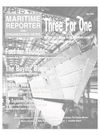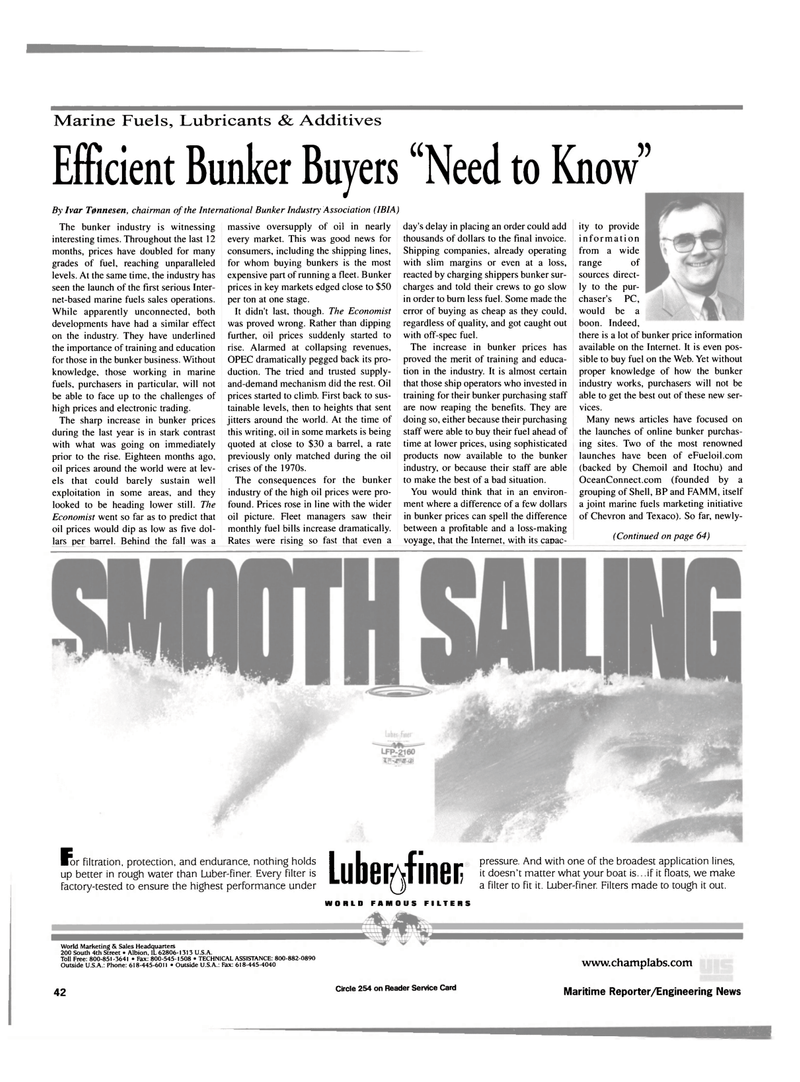
Page 44: of Maritime Reporter Magazine (May 2000)
Read this page in Pdf, Flash or Html5 edition of May 2000 Maritime Reporter Magazine
Marine Fuels, Lubricants & Additives
Efficient Bunker Buyers "Need to Know"
By Ivar T0nnesen, chairman of the International Bunker Industry Association (IBIA)
The bunker industry is witnessing interesting times. Throughout the last 12 months, prices have doubled for many grades of fuel, reaching unparalleled levels. At the same time, the industry has seen the launch of the first serious Inter- net-based marine fuels sales operations.
While apparently unconnected, both developments have had a similar effect on the industry. They have underlined the importance of training and education for those in the bunker business. Without knowledge, those working in marine fuels, purchasers in particular, will not be able to face up to the challenges of high prices and electronic trading.
The sharp increase in bunker prices during the last year is in stark contrast with what was going on immediately prior to the rise. Eighteen months ago, oil prices around the world were at lev- els that could barely sustain well exploitation in some areas, and they looked to be heading lower still. The
Economist went so far as to predict that oil prices would dip as low as five dol- lars per barrel. Behind the fall was a massive oversupply of oil in nearly every market. This was good news for consumers, including the shipping lines, for whom buying bunkers is the most expensive part of running a fleet. Bunker prices in key markets edged close to $50 per ton at one stage.
It didn't last, though. The Economist was proved wrong. Rather than dipping further, oil prices suddenly started to rise. Alarmed at collapsing revenues,
OPEC dramatically pegged back its pro- duction. The tried and trusted supply- and-demand mechanism did the rest. Oil prices started to climb. First back to sus- tainable levels, then to heights that sent jitters around the world. At the time of this writing, oil in some markets is being quoted at close to $30 a barrel, a rate previously only matched during the oil crises of the 1970s.
The consequences for the bunker industry of the high oil prices were pro- found. Prices rose in line with the wider oil picture. Fleet managers saw their monthly fuel bills increase dramatically.
Rates were rising so fast that even a day's delay in placing an order could add thousands of dollars to the final invoice.
Shipping companies, already operating with slim margins or even at a loss, reacted by charging shippers bunker sur- charges and told their crews to go slow in order to burn less fuel. Some made the error of buying as cheap as they could, regardless of quality, and got caught out with off-spec fuel.
The increase in bunker prices has proved the merit of training and educa- tion in the industry. It is almost certain that those ship operators who invested in training for their bunker purchasing staff are now reaping the benefits. They are doing so, either because their purchasing staff were able to buy their fuel ahead of time at lower prices, using sophisticated products now available to the bunker industry, or because their staff are able to make the best of a bad situation.
You would think that in an environ- ment where a difference of a few dollars in bunker prices can spell the difference between a profitable and a loss-making voyage, that the Internet, with its capac- ity to provide information from a wide range of sources direct- ly to the pur- chaser's PC, would be a boon. Indeed, there is a lot of bunker price information available on the Internet. It is even pos- sible to buy fuel on the Web. Yet without proper knowledge of how the bunker industry works, purchasers will not be able to get the best out of these new ser- vices.
Many news articles have focused on the launches of online bunker purchas- ing sites. Two of the most renowned launches have been of eFueloil.com (backed by Chemoil and Itochu) and
OceanConnect.com (founded by a grouping of Shell, BP and FAMM, itself a joint marine fuels marketing initiative of Chevron and Texaco). So far, newly- (Continued on page 64) f)r filtration, protection, and endurance, nothing holds up better in rough water than Luber-finer. Every filter is factory-tested to ensure the highest performance under Luber-finer
WORLD FAMOUS FILTERS pressure. And with one of the broadest application lines, it doesn't matter what your boat is.. .if it floats, we make a filter to fit it. Luber-finer. Filters made to tough it out.
World Marketing & Sales Headquarters 200 South 4th Street • Albion. IL 62806-1313 U.S.A.
Toll Free: 800-851-3641 • Fax: 800-545-1508 • TECHNICAL ASSISTANCE: 800-882-0890
Outside U.S.A.: Phone: 618-445-6011 • Outside U.S.A.: Fax: 618-445-4040 42 Circle 254 on Reader Service Card www. champlabs. com
Maritime Reporter/Engineering News

 43
43

 45
45
